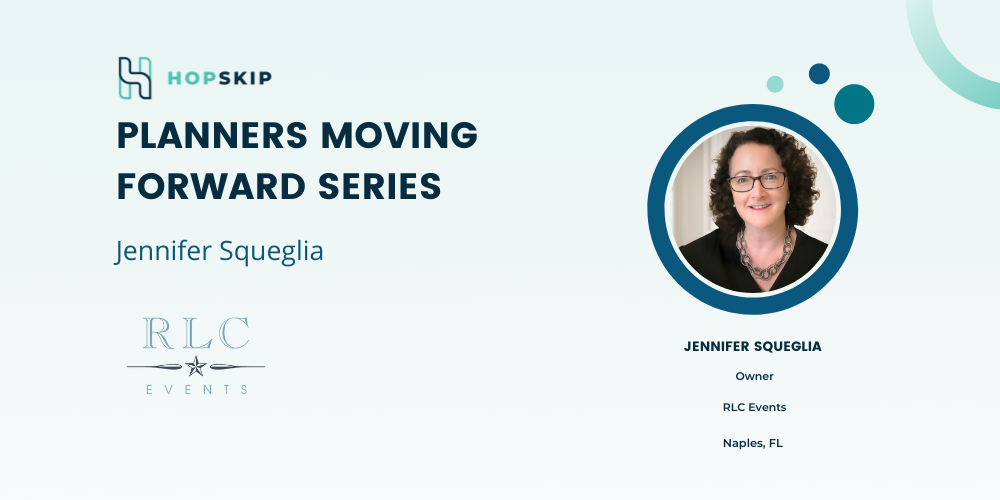Planners Moving Forward Series- Jennifer Squeglia, RLC Events
Jennifer Squeglia, of RLC Events, brings awareness of how they adapted to COVID-19, communicating and lessons learned and sharing how they are viewing the meetings and events industry in a post-pandemic world.
This post is part of the HopSkip Planner Spotlight Series where HopSkip spotlight's planners across the industry to bring awareness of how they adapted to COVID-19, communicating and lessons learned and sharing how they are viewing the meetings and events industry in a post-pandemic world.
Name: Jennifer Squeglia
Company Name: RLC Events
Job Title: Owner
Years of Experience: 36
How do you think you are positioned, after months of persevering with the pandemic, to take advantage of our new and disrupted meetings/events landscape?
The last (nearly) two years has given me the opportunity to learn new skills with virtual events, hone in on the critical aspects of attendee engagement, practice flexibility, and pause when appropriate to wait for changes to settle down. It also has reinforced the value of in-person connection, the importance of good health and its influence on our events, and above all, the powerful and enduring relationships with our industry peers, especially our partners in hospitality.
As our community moves forward with planning in-person meetings, what new technologies or processes are you implementing that you may have not looked at before?
As we venture out to in-person events, it is more important than ever to focus on engagement and the value of people connecting face-to-face. Technology will always be an important tool and staying up to date with the most current offerings will be instrumental in being relevant. As people come back together, however, they are enjoying the lower tech features of that impromptu discussion at the coffee station or bonding over a meaningful activity, such as giving back to the community. The emphasis on incorporating longer breaks, more room for interpersonal connection, wellness, and sustainability into your meeting design is more important than ever.
As we see virtual meetings transition back to face to face, hybrid meetings are beginning to be the vehicle to return to normalcy. What are your thoughts on hybrid meetings versus traditional fully in-person meetings?
Hybrid is an inclusive option for those not fully comfortable venturing out and also offers an opportunity to deliver your message to a larger audience. When doing hybrid well, however, it can be very costly and a significant use of resources. Depending on the industry and type of event, hybrid is here to stay, but in many industries, such as financial and insurance, I think it will be temporary.
In your opinion, what do you think the biggest value for your attendees is in regards to returning to live events?
The positive energy and multiple benefits of face to face human connection, which builds trust and loyalty with the host organization.
As the pandemic fades away and we return to face-to-face events what do you hope changes, either for planners or hoteliers, in the traditional RFP and proposal process as a result of all of the learnings from the last 20+ months?
The importance of partnership with our hospitality professionals is more important than ever. We obviously have gotten wiser with our contract clauses and the technical aspects of doing business together, but the pandemic has brought out a human element and I think as a planner, it is more important than ever to show transparency and empathy. In the end, we all want the same thing, so working together to achieve a win/win with a respectful approach is what I will always strive for.
This post is part of the HopSkip Planner Spotlight Series where HopSkip spotlight's planners across the industry to bring awareness of how they adapted to COVID-19, communicating and lessons learned and sharing how they are viewing the meetings and events industry in a post-pandemic world.
